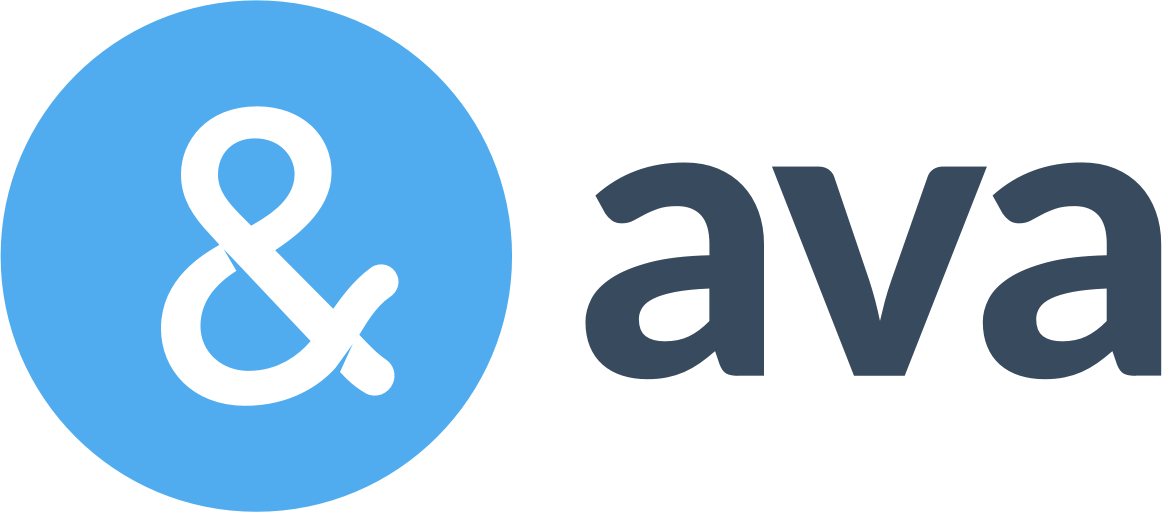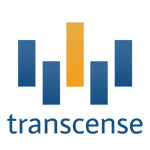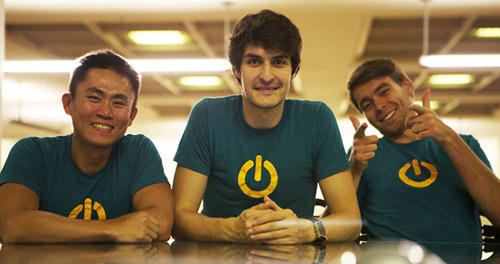Transcence App Makes Group Conversations Between Deaf and Hearing Possible
 UPDATE: Transcense has rebranded as Ava! www.ava.me
UPDATE: Transcense has rebranded as Ava! www.ava.me
This team of Cal entrepreneurs is working hard to bridge the communication gap between D/deaf and hard of hearing individuals and the hearing world. To do this, they are developing a mobile app that translates group conversations into text, providing users 24/7 autonomy to actively participate in any situation at any moment.
 |
The Transcense team includes Thibault Duchemin, M. Eng. ’14, a data scientist from France, Skinner Cheng, a (deaf) software developer from Taiwan, and Pieter Doevendans, a Cal student and civil engineer from The Netherlands. Their groundbreaking app, named Transcence, connects to any smart devices present in a group setting. Using speech recognition and speaker identification technologies. Transcence recognizes who is talking and what each person says, then display the conversation on a smartphone or tablet.
The Transcence team is currently running a campaign on Indiegogo to get the word out and reach those who are helped by this technology. Please view their video to learn more about who they are and what they are doing.
|
|
Q. What significant challenge is your company working to solve, and how are you doing it?
Transcense aims to bridge the communication gap between deaf and hard of hearing individuals, and the hearing world. After talking to more than 300 people in our market about their everyday experience, we know exactly what the specific pains are and how we can address them. We learned that for people hard of hearing (moderate to severe hearing loss), and deaf people, it’s impossible to follow group conversations. When these people find themselves in a family dinner, business meeting, or any social or professional group situation, they are completely lost, and will give up. Most of the time these situations are avoided.
To solve this problem, we are developing a mobile application that translates group conversations into text. The app connects to the many smart devices already present in the group. Using speech recognition and speaker identification technologies, the app recognizes who is talking and what the person says, and displays this on your smartphone or tablet. It provides 24/7 autonomy to actively participate in any situation at any moment.
We’re working at the forefront of speech recognition technologies, with a system that implies intense behavioral change. What if the first impression the user gets is that of a non-accurate product? What if one guy in the room categorically refuses to use Transcense? What if the person wants to use Transcense in the situation it’s not meant to be used?
We’re solving this by testing all the time, talking with customers and great advisors, and being obsessed by 3 core values we want to deliver. We believe these are key to our Unique Value Proposition (autonomy in any group conversation): 1 - accuracy, 2 - speed, 3 - user-friendliness.
Q. What have you carried from your Berkeley experience to your work in innovation/entrepreneurship?
Berkeley is the perfect place for growing your idea into a startup and eventually into a real business. Berkeley has an amazing ecosystem for young (student) entrepreneurs who are looking to build a startup. There are multiple incubator spaces, like Venture Lab, Skydeck, The Foundry and more. Every day there are a lot of events related to entrepreneurship. Furthermore there are the big competitions like GSVC, Big Ideas and Launch. The network of entrepreneurs, teachers, researchers and investors is extremely diverse and powerful. As a first time entrepreneur, Berkeley provides resources one wouldn’t have elsewhere.
For me the most important takeaway from my times in Berkeley is to ‘take’ when you need and ‘give back’ when you can. By sharing your knowledge, experience, or any other resource with others, you will also get back when you are in need of help. When you are building something cool or impactful, people are very likely to help and support. Whether it’s a professor, director or program manager, a fellow student, there is a great vibe around the startup community that has a positive connotation and makes everyone prepared to help.
At UC Berkeley there is a very clear work ethic. People strive to be among the best of the world. Ambitions are unstoppable and the general mentality is to change the world. It’s truly amazing to see how many bright and motivated people walk around at UC Berkeley. Having such an environment around you puts the bar much higher. It pushes you to set your goals behind what you think is possible, and make the impossible happen.
Q. Knowing what you know now, what would you have done differently at Cal, or what programs/activities/etc. would you have taken advantage of to prepare for your career in innovation?
It’s been less than a year since we graduated from Cal, and yet the number of lessons learned is huge. We really took advantage of the UC Berkeley campus, and the amazing ecosystem. But there are a couple of points we could have done better:
Settling on mentors: We had a lot of people helping us, and I know it would have been even better to settle on a limited number of mentors, and to take the time to develop a real relationship with them. Consulting and filing for IP: Provisional patent, security questions, data safety were problems we could have easily asked a Law School student to help us with. We shouldn’t have been afraid of it. Connecting to Berkeley students: Berkeley students are smart and driven, and we could have gone even further by starting some relationships that would have been helpful to scout and recruit the best and brightest.
Q. What advice would you offer Berkeley students just beginning their careers in the startup world, either as founders or as early team members?
The user is the one key stakeholder you need to listen to at all times. From the first beginning to the utter end, you need to keep talking with your user to know exactly what they want. When you do this well, and you reach a point of user growth, the rest will come with it. Whether you need investment money, new team members, partners, or any other help, when you have a consistently growing user base, you will get it. The quickest and safest way to reach that point of user growth is by knowing exactly what your user wants, needs, undertakes, etc. Startups that do this well are often saved from spending endless time and money on things that do not matter and will never be adopted.
When you run a startup and talk to mentors, advisors and investors of all kinds every day, you will easily get distracted or confused. One advisor can tell you to focus on getting your product polished, while another advisor will tell you to focus on keeping it as simple as possible and ship it while it’s still in draft mode. It is key that you set very clear strategic, higher level, goals (vision) that guide you at all times. From your higher level goals you need to set out more detailed chunks of work. It’s okay to adopt and adapt these processes based on output from outside, but you need to make sure to put up a filter when you listen to what other people advice you. Even when they are serial entrepreneurs, raised millions of dollars, and are extremely successful, you know your business better than anyone else (at least you should). And remember - always listen to your users.
Q. What is the most rewarding thing about your work with your current company?
One thing I realized, related to the fact that we are startup founders, is that if we stop working the company stops working as well. It is our creation, and it still relies on us. This has a number of consequences. When good things or bad things happen to the startup, emotions are multiplied. A great technological breakthrough puts you in a great mood until bad news puts you off. But the perpetual creation act is extremely gratifying.
You get to work on a great variety of things in a very fast pace. One day you are recruiting actors and editing your campaign video, the next day you are writing a patent.
As social entrepreneurs, when we started putting our product in the hands of our users, and especially when we revealed it to the public, through our crowdfunding campaign, the responses we got boosted me in a way I rarely experienced. Personal stories and testimonials of people who are frustrated in life, unhappy and desperate to get our product. Knowing that you’re literally giving hope to so many people that are left out today, by something you are developing, is an intense feeling. An example: “If I had known this existed, I would not have quit my job”. Not your typical user feedback, right?
Our co-founder, Skinner, has been deaf since he was 2 years old. He does not know sign language and does not verbally communicate. We use whiteboards and computer chat to communicate with him. Since we have a working product, we started using this with him. During lunches, out on the street, in a cab, or even in bars, we can now use our own product to communicate with him. It’s really amazing to see the value of what you are building when using it every day with your own co-founder.
Q. What keeps you up at night?
We’re not trying to push a cool product in the hands of a market we don’t know about, hoping that it will take off. Instead, we are solving a huge need for 360 million people in the world. This keeps us up at night. We have the possibility to make a huge impact on society, and change the lives of so many people. We’re so convinced that Transcense has to exist and this problem has to be fixed, that there’s no way to slow down. We wouldn’t be working 17 hours per day if we were not passionate about this problem.

 From left to right: Skinner Cheng, Thibault Duchemin and Pieter Doevendans
From left to right: Skinner Cheng, Thibault Duchemin and Pieter Doevendans